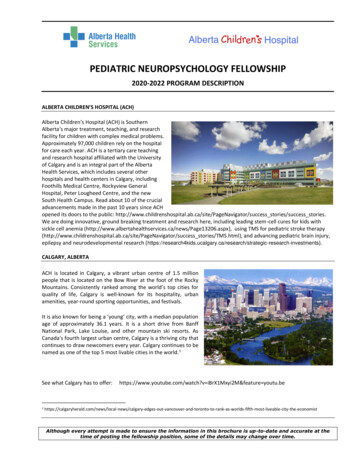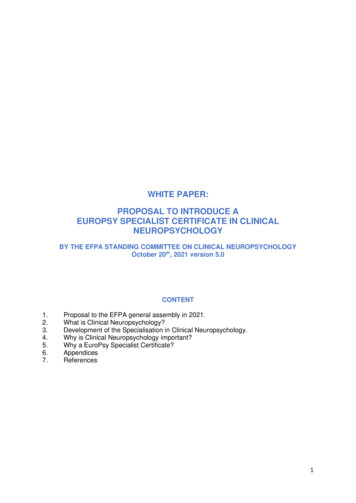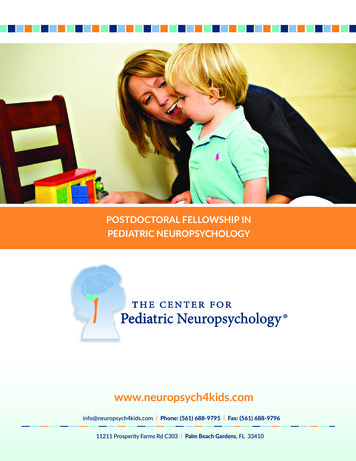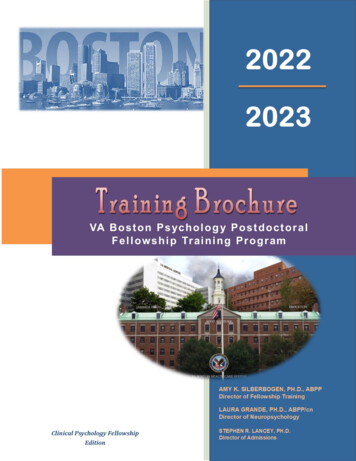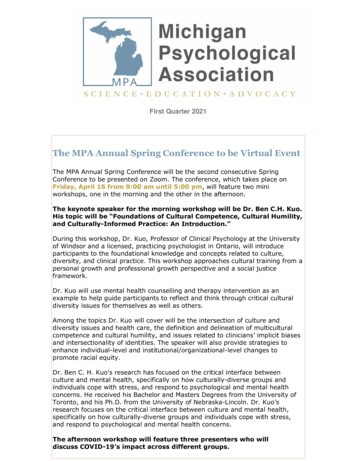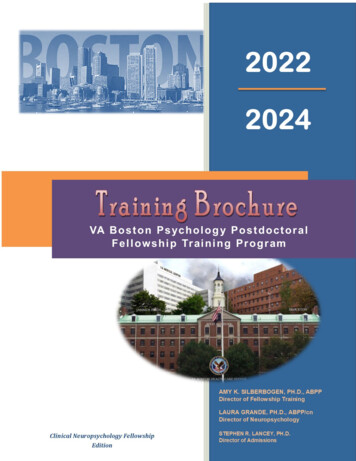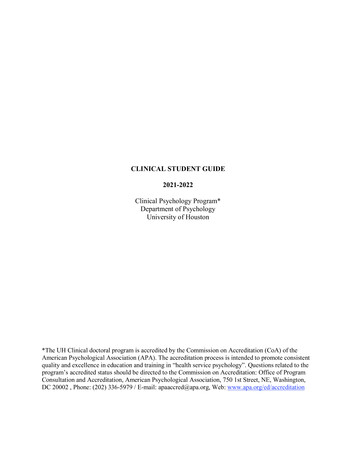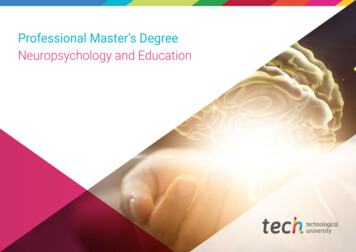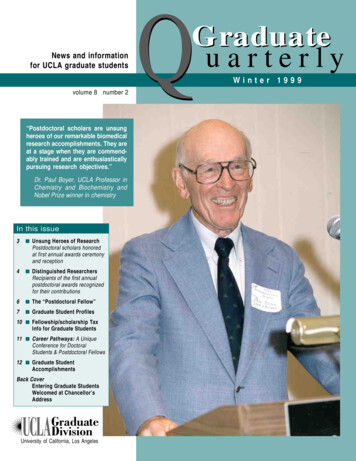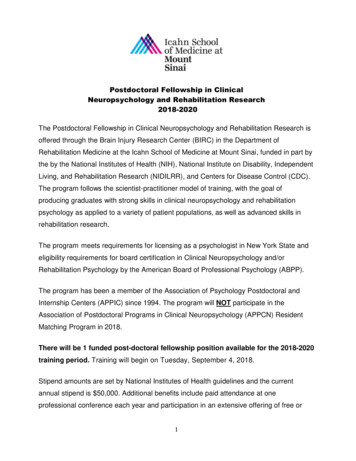
Transcription
Postdoctoral Fellowship in ClinicalNeuropsychology and Rehabilitation Research2018-2020The Postdoctoral Fellowship in Clinical Neuropsychology and Rehabilitation Research isoffered through the Brain Injury Research Center (BIRC) in the Department ofRehabilitation Medicine at the Icahn School of Medicine at Mount Sinai, funded in part bythe by the National Institutes of Health (NIH), National Institute on Disability, IndependentLiving, and Rehabilitation Research (NIDILRR), and Centers for Disease Control (CDC).The program follows the scientist-practitioner model of training, with the goal ofproducing graduates with strong skills in clinical neuropsychology and rehabilitationpsychology as applied to a variety of patient populations, as well as advanced skills inrehabilitation research.The program meets requirements for licensing as a psychologist in New York State andeligibility requirements for board certification in Clinical Neuropsychology and/orRehabilitation Psychology by the American Board of Professional Psychology (ABPP).The program has been a member of the Association of Psychology Postdoctoral andInternship Centers (APPIC) since 1994. The program will NOT participate in theAssociation of Postdoctoral Programs in Clinical Neuropsychology (APPCN) ResidentMatching Program in 2018.There will be 1 funded post-doctoral fellowship position available for the 2018-2020training period. Training will begin on Tuesday, September 4, 2018.Stipend amounts are set by National Institutes of Health guidelines and the currentannual stipend is 50,000. Additional benefits include paid attendance at oneprofessional conference each year and participation in an extensive offering of free or1
low-cost seminars, workshops, and courses offered by the School of Medicine on topicssuch as research methodology and professional development, computer program skillstraining, and leadership skills and public speaking. Fellows also receive a minimum of 15vacation days, 12 sick days, and 8 major holidays per year. Health, vision, dental, andmalpractice insurances also are provided.The Medical School Real Estate Office located at 1249 Park Avenue (212-659-9630) canprovide information about affordable housing in the area. Below-market rate apartmentrentals located in close proximity to the hospital are available to Mount Sinai Postdoctoralfellows. Mount Sinai is easily accessible by public transportation from all surroundingboroughs. Parking at Mount Sinai is available for a reduced fee and may be arrangedthrough the Real Estate Office. Hotel, travel, and entertainment (e.g. Broadway shows)discounts are available through the Recreation Office at 19 East 98th Street (212-2416660).CLINICAL TRAININGFellows spend at least 50% of their time providing clinical services to patients in theDepartment’s Rehabilitation Neuropsychology Faculty Practice under the supervision ofclinical faculty. Fellows conduct comprehensive neuropsychological evaluations toaddress a variety of referral questions, including diagnostic clarification, designingtreatment plans or making recommendations for improving daily functioning, andinforming patients’ decision-making (e.g. return to work or school). Fellows also provideclinical interventions including cognitive remediation and psychotherapy in individual,family, and/or group formats. Treatment provided within the practice can be either shortor long-term. Cognitive remediation typically involves delivering empirically supportedstructured exercises and developing compensatory cognitive techniques tailored to eachpatient. Psychotherapy offered within the practice reflects an integrative butpredominantly cognitive-behavioral approach with the goal of educating patients about,and facilitating adjustment to, neurological disability. Clinical training is designed toadhere to the Houston Conference guidelines for specialty training in clinicalneuropsychology, and Clinical training is designed to adhere to the Houston Conference2
guidelines for specialty training in clinical neuropsychology, and contributes toRehabilitation Psychology board certification eligibility.Fellows will mostly see adults with acquired brain injury (TBI, anoxia, stroke) but willalso occasionally see individuals with other diagnoses (e.g. dementia, movementdisorders, and spinal cord injury), all with or without co-morbid mood and/or adjustmentdisorders. The practice occasionally accepts children and adolescents, and thesepatients are assigned to fellows based on fellows’ prior experience and/or interest inworking with pediatric patients. The variety of clinical diagnoses and symptompresentations of patients referred to the practice, coupled with cultural and socioeconomic variety of individuals living in New York City, ensure that fellows gainexperience with an extremely diverse patient population.Clinical training is designed to help fellows develop a sophisticated understanding ofbrain-behavior relationships, enhance neuropsychological evaluation skills, andprovide neurorehabilitation interventions that improve our patients’ functional ability,emotional adjustment and overall wellbeing. Weekly individual and group supervisionwith one or more clinical faculty is provided. Direct supervision is provided forintake/diagnostic interviews and neuropsychological evaluation feedback.RESEARCH TRAININGFellows spend approximately 50% of their time in research activities, working closely witha multidisciplinary team in the Brain Injury Research Center, led by Dr. Kristen DamsO’Connor. Fellows are involved in nearly every stage of the research process, fromproject conceptualization, execution, analysis, and dissemination. Fellows contribute tothe implementation of existing research studies and complete one or more independentresearch projects under the mentorship of faculty. Fellows’ research efforts are expectedto culminate in presentation(s) at national or international conferences and leadauthorship of at least one first-author publication and/or grant application (to supportfurther research either during or beyond fellowship training). More information aboutcurrent and recently completed studies (for which extensive data are available forsecondary analysis) can be found at www.tbicentral.org.3
Fellows are expected to demonstrate competence in basic research skills (e.g. scientificliterature review, identification of a research question, study design, and familiarity withdata analysis and scientific writing) prior to training. Postdoctoral research training isdesigned to help fellows refine existing skills, apply these skills to rehabilitationpopulations, and develop additional skills essential for conducting clinical rehabilitationresearch.Research training includes active participation in weekly multidisciplinary researchmeetings as well as seminars in research methodology and in statistical methods.Research training activities include individual and group supervision as well asparticipation in weekly research planning/progress meetings that include all BIRC staff. Inaddition, a wide variety of didactic seminars on topics such as effective scientific writing,preparing a competitive grant application, and scientific presentation skills are offeredwithin the larger Mount Sinai community. In addition, fellows have the opportunity toassist faculty in the preparation of manuscripts and center-wide grant applications.DIDACTICSClinical didactics include seminars in neuroanatomy, functional neuroanatomy, clinicalneuropsychology, and neurorehabilitation interventions for cognitive and/or emotionaldisorders. Fellows can attend weekly neuroradiology seminars, neuropathologyconferences and brain cuttings offered by the Department of Pathology and grandrounds offered by the Departments of Rehabilitation Medicine, Neurology, andPsychiatry. Fellows can also take advantage of the translational neuroscience seminarseries and programs offered through the Friedman Brain Institute and The Translationaland Molecular Imaging Institute, including the Brain Imagining and Alzheimer's Diseaseand Neurodegeneration Clubs. Research didactics consist of regular seminars inresearch design and statistical methods. Fellows are also involved in teaching and somesupervision of pre-doctoral interns in the department’s APA-approved rehabilitationneuropsychology internship program.THE TRAINING ENVIRONMENTThe Mount Sinai Medical Center (MSMC), located on the Upper East Side of Manhattan,4
is one of the oldest and largest hospitals in the country, with more than 1,200 beds andapproximately 150 outpatient clinics that provide services in all medical specialties andsubspecialties. MSMC is the flagship site of the recently formed Mount Sinai HealthSystem, which includes Mount Sinai Hospital, Mount Sinai Brooklyn, Mount SinaiQueens, Beth Israel Medical Center, Mount Sinai West, St. Luke’s Hospital, and the NewYork Eye and Ear Infirmary.The Mount Sinai School of Medicine, recently renamed the Icahn School of Medicine atMount Sinai, was founded in 1852 and has achieved national and internationalrecognition for its programs in education, basic and applied research, and innovativepatient care. The School consistently ranks among the top medical schools in the US(#22 for research and #3 for geriatrics, US News and World Report).The Department of Rehabilitation Medicine at Mount Sinai has specialty programs inbrain injury and spinal cord injury, which is staffed by more than 110 professionals whoprovide clinical care services during approximately 85,000 patient visits per year. Thedepartment provides comprehensive interdisciplinary physical rehabilitation along acontinuum of care that includes acute hospitalization, inpatient and outpatient treatment,and long-term follow-up (e.g. community integration). The department houses trainingprograms for a variety of rehabilitation disciplines, including psychiatry, psychology,physical therapy, occupational therapy, speech therapy, social work, vocationalcounseling, and therapeutic recreation. Mount Sinai is the only hospital in New YorkState that is recognized as being a Model System of Care in both TBI and Spinal CordInjury.TRAINING FACULTYKristen Dams-O’Connor, Ph.D., Associate Professor of Rehabilitation Medicine andNeurology, is a clinical neuropsychologist who specializes in neuropsychologicalassessment, neurorehabilitation, and cognitive remediation. Her clinical specialization isin working with adults with neurological impairments resulting from TBI, stroke, anoxia,sports concussion, brain tumors, dementia, and movement disorders. Dr. DamsO’Connor is Director of the BIRC and Project Director of the New York Model System of5
Care. Her research focuses on understanding the long-term sequelae of TBI andclarifying the association of TBI with subsequent development of neurodegenerativedisease. Her work has focused on applying advanced psychometric methods torehabilitation outcome assessment tools, measuring long-term outcomes after TBI, TBI inthe elderly, and sports concussion. She is principal investigator of multiple federallyfunded grants from the NIH, Patient Centered Outcomes Research Institute,Department of Defense, and NIDILRR. Dr. Dams-O’Connor received her doctorate incounseling psychology at the University at Albany, State University of New York. Shecompleted a pre-doctoral internship in rehabilitation psychology at the RuskInstitute/NYU Medical Center and a postdoctoral fellowship in Rehabilitation Researchand Clinical Neuropsychology at the Mount Sinai School of Medicine.Maria Kajankova, Ph.D., (Director of Training) is an Assistant Professor in theDepartment of Rehabilitation Medicine. She is a clinical neuropsychologist specializing inneuropsychological evaluations, cognitive remediation, and psychotherapy with patientsexperiencing a variety of neurological disorders including stroke, movement disorders,and acquired brain injury. Dr. Kajankova received her Ph.D. in counseling psychologyfrom Fordham University. She completed her pre-doctoral internship in rehabilitationpsychology at the Rusk Institute of Rehabilitation Medicine and her post-doctoralfellowship in rehabilitation research and clinical neuropsychology at the Icahn School ofMedicine at Mount Sinai. Her research focuses on qualitative research methods andtopics related to pediatric brain injury and rehabilitation, evaluation of concussionpolicies, and interventions for individuals with TBI and their caregivers.Stephanie Kolakowsky-Hayner, Ph.D., is an Associate Professor in the Departmentof Rehabilitation Medicine. She serves as the Director of Spinal Cord Injury Research,a Senior Investigator in the Brain Injury Research Center, and the Director ofRehabilitation Research Education. She is also the Immediate Past Chairman of theBoard of the Brain Injury Association of California. She is a member of the Academy ofCertified Brain Injury Specialists’ Board of Governors and the American Congress ofRehabilitation Medicine Board of Governors. Stephanie is the Vocational-CommunityIssues Panel Chair for the Brain Injury Association of America and Mount Sinai’s6
Guidelines for Rehabilitation and Chronic Disease Management of Adults withModerate to Severe Traumatic Brain Injury development project. She also serves onthe Community Advisory Board of the DOD-funded Chronic Effects of NeurotraumaConsortium and as the Co-Chair of the 4th Federal Interagency Conference onTraumatic Brain Injury. Stephanie has over 20 years of progressively independentexperience in research related to brain injury, spinal cord injury, stroke, and otherneurologic disorders.Lisa Spielman, Ph.D., is the statistical consultant for the BIRC, a position she has heldsince 1998. She has served as a senior data analyst for the Geriatric Clinical ResearchCenter at Westchester Division of New York Hospital and for the HIV Clinical ResearchProgram at New York Hospital-Cornell Medical Center. Dr. Spielman consults withprivate organizations and numerous principal investigators in academic settings ondesign and statistical analysis for federally funded grants.Wayne A. Gordon, Ph.D., ABPP-CN, FACRM, Jack Nash Professor and Vice Chair ofthe Department of Rehabilitation Medicine, is Chief of the Neuropsychology andRehabilitation Psychology Service and Principal Investigator of the TBI Injury ControlResearch Center. Dr. Gordon received his PhD in Education Psychology from YeshivaUniversity. Dr. Gordon is board-certified in clinical neuropsychology by the AmericanBoard of Professional Psychology and a Fellow in the Academy of Behavioral MedicineResearch.Adjunct FacultyDale Hesdorrfer, Ph.D., Associate Professor of Clinical Epidemiology at theMailman School of Public Health at Columbia University, is an epidemiologist whoseresearch interests include seizure disorders, co-morbidity of epilepsy and psychiatricdisorders, and the epidemiology of neurological abnormalities among children withfebrile seizures. She has been the recipient of NIH and CDC funding. She has been thelead investigator of a Brain Trauma Foundation grant involving several projects, includinga prospective cohort study of outcome predictors after severe traumatic brain injury, asurvey of compliance with acute care guidelines in trauma centers across the UnitedStates, and a quality improvement program for the acute management of severe TBI in7
New York State. She also serves as a co-investigator for an NIH-funded datacoordinating center for clinical trials in TBI, where she directs the data input unit.David Layman, Ph.D., ABPP-CN, is a board certified clinical neuropsychologist inindependent practice in New York City. He earned his Doctorate in CounselingPsychology, with a Graduate Specialty Certificate in Gerontology, from the University ofKentucky. He completed a two-year Postdoctoral Fellowship in AdvancedNeuropsychology and Rehabilitation Research in the Department of RehabilitationMedicine at the Mount Sinai Medical Center. Dr. Layman specializes in outpatienttreatment of individuals and couples dealing with acquired brain injury, and other medicaland neurological conditions. His clinical interests include adult neuropsychologicalassessment, neurorehabilitation, trauma recovery, and individual and couplespsychotherapies. Dr. Layman is past-president of the New York State Association ofNeuropsychology and is currently active within the organization. Dr. Layman is leads ayear-long seminar series on “Special Topics in Neuropsychology,” and a monthlyseminar in neuropsychological test interpretation using the “Fact Finding” model.Janine A. Tiago, Ph.D. ABPP-CN, is a board certified clinical neuropsychologist andboard eligible rehabilitation psychologist in private practice specializing inneuropsychological evaluations, psychotherapy and cognitive remediation. She leads amonthly seminar in neuropsychological test interpretation using the “Fact Finding” modelto help trainees prepare for future board certification. Dr. Tiago received her Doctorate inClinical Psychology with concentrations in Neuropsychology, Child Therapy, and GroupDynamics, from Teachers College, Columbia University, where she is currently AdjunctAssistant Professor of Psychology and Education in the Department of Counseling andClinical Psychology. She completed a Postdoctoral Fellowship in Neuropsychology andRehabilitation Psychology in the Department of Rehabilitation Medicine at the MountSinai Medical Center. Her areas of clinical interests are in culture and diversity as itimpacts clinical practice, as well as psychotherapeutic issues within a rehabilitationsetting, including the impact of cognitive deficits on intrapsychic and psychosocialadjustment.8
Suzan Uysal, Ph.D., ABPP-CN, Associate Professor in the Department ofAnesthesiology, is a research psychologist involved in ongoing studies of neurocognitivechanges following cardiac surgery. Dr. Uysal is board certified in clinicalneuropsychology by the American Board of Professional Psychology. Prior to hercurrent position, Dr. Uysal was a research psychologist in the Department ofRehabilitation Medicine. Dr. Uysal received her Ph.D. in experimental psychology fromNew York University and a certificate of re-specialization in clinical neuropsychology fromthe City University of New York. Her areas of specialization include neuroanatomy,neurophysiology, and neuropsychological assessment.APPLYING TO THE PROGRAMIndividuals with a doctoral degree in clinical or counseling psychology who have trainingand experience in clinical neuropsychology and/or rehabilitation psychology are stronglyencouraged to apply. Candidates should have completed all doctoral degreerequirements and be eligible for a limited permit to practice psychology in New YorkState by the time training begins. Preference will be given to applicants who havecompleted an APA-approved doctoral program, but candidates from non-approvedprograms are welcome to apply. Applicants must have completed an APA- or CPAapproved clinical internship.Individuals with a doctoral degree in an allied rehabilitation discipline (e.g. DisabilityStudies, Public Health, Sociology), and those from minority and/or disabilitybackgrounds, are encouraged to apply. Preference will be given to individuals who areUS citizens or permanent residents, but others may apply if they anticipate being able toobtain the credentials needed to complete the program.All successful applicants must provide the Office of Postdoctoral Affairs with a copy oftheir doctoral degree or a letter from their doctoral program’s registrar documentingcompletion of all degree requirements before training begins. In-person interviews arestrongly preferred, but interviews via videoconferencing (e.g. Skype, Go-To-Meeting) willbe considered on a case-by-case basis for applicants with extraordinary travel limitations.Interviews with faculty and current fellows will be scheduled in January and February.9
Completed applications must be received by January 2, 2018Applications must include the following in order to be considered:1. Cover letter2. Curriculum vitae that includes citizenship and languages spoken fluently3. Statement of clinical psychology experience that addresses:a. Prior clinical training/experience, including patient populations servedb. Your preferred approach to neuropsychological evaluation and treatment(both cognitive remediation and psychotherapy)c. Goals for clinical training and professional development during fellowship4. Statement of research experience that addresses:a. Prior research training/experience with data management, researchdesign, and statisticsb. Rehabilitation research interestsc. Goals for research training and professional development during fellowship5. Two to four letters of recommendation:a. One or two letters from clinical supervisor(s), e.g. internship trainingdirector, ANDb. One or two letters from research supervisor(s), e.g. dissertationchair/mentor6. Graduate school transcript (unofficial accepted for application purposes)7. One sample neuropsychological report and one treatment case summary (requiredfor applicants with a doctoral degree in clinical or counseling psychology only)8. Representative copies of abstracts, publications, and/or research presentationsApplications may be sent via E-mail to:Maria Kajankova, Ph.D., Director of TrainingTel: (212) 241-3379Department of Rehabilitation MedicineFax: (212) 241-0137Icahn School of Medicine at Mount Sinaimaria.kajankova@mountsinai.orgOne Gustave L. Levy Place, Box 1163, New York, New York 10029-657410
Association of Postdoctoral Programs in Clinical Neuropsychology (APPCN) Resident Matching Program in 2018. There will be 1 funded post-doctoral fellowship position available for the 2018-2020 training period. Training will begin on Tuesday, September 4, 2018. Stipend amounts are set by National Institutes of Health guidelines and the current
